DB Cargo CEO Sigrid Nikutta and KfW CEO Stefan Wintels on the decade of decision, the transformation to carbon neutrality and the competition for the best employees.
KfW Group and DB Cargo have a lot in common. They have an important role to play in meeting the climate targets of the German Federal Government. KfW is to provide support for the climate and digital transformation of the economy and society, and act as a co-venture capital provider. As for Deutsche Bahn, the German railway company, the German Federal Government expects the number of rail passengers to double and freight transport to increase significantly. At the same time, both companies are in demand as crisis managers of the German Federal Government. KfW is supporting large energy companies as well as medium-sized and small enterprises as they cope with the consequences of the war in Ukraine. DB Cargo is preventing global famine with what is known as the grain bridge.
DR SIGRID NIKUTTA
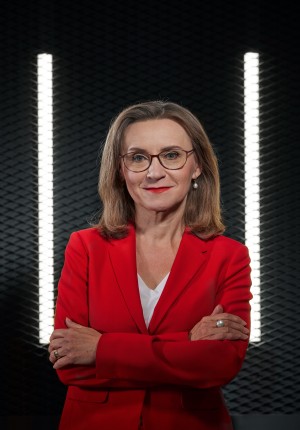
has been head of DB Cargo since 2020. As Chairperson of the transport authority Berliner Verkehrsbetriebe, she was previously responsible for the award-winning “Weil wir dich lieben” campaign (translation: “Because we love you”). She has a doctorate in psychology and five children.
Read moreMs Nikutta, 66,000 people follow you on LinkedIn. Is this due to your optimistic perspective?
SIGRID NIKUTTA I like to communicate! And a lot too, because there is so much to say. The importance of good communication cannot be overstated. Optimism comes from the Latin “optimum” and means the best. And that’s exactly what my posts and my everyday professional life are all about: doing the best with an organisation, doing the best for our customers, and even being the best at communicating.
Is a propensity for optimism a prerequisite for a management position?
NIKUTTA It helps enormously. As a manager, you are only as good as the team and the group of people that works with you. And it takes a positive outlook on the future to give the team motivation and energy, especially in these challenging times. Because we can shape this future.
Stefan Wintels
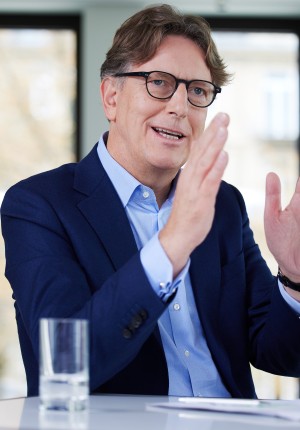
has been head of the state-owned promotional bank KfW for a year. His aim is to position KfW in such a way that it makes an effective contribution to the sustainable transformation of the economy and society. He is the father of four children and an enthusiastic fan of Werder Bremen football team.
Read moreMr Wintels, when you took up the position of Chief Executive Officer of KfW in October 2021, the world was a very different place. How do you motivate yourself and your employees in a situation where there is little reason for optimism?
STEFAN WINTELS Germany and Europe face enormous tasks and challenges on an extremely large scale during this decade of decision. We need to reshape the foundations of our entire economic model. KfW is required to contribute all its experience and know-how to efficiently assist this process. This is a tremendous incentive for us all. At the same time, it is important to remember that KfW can look back on 75 years of history in 2023. Its establishment is closely linked to the development of the social market economy and our democracy. Since then, KfW has repeatedly contributed to overcoming momentous challenges – and transformed itself as it rose to these challenges. KfW knows how change works.
What are your priority areas?
WINTELS There are three main challenges. Our future depends on tackling climate change and our efforts to strengthen Germany as a technological hub. These two objectives are interdependent: digitalisation and innovation are accelerating the transformation to carbon neutrality. A third dimension has been added since the war in Ukraine. We need to strengthen the sovereignty and resilience of Germany, Europe and the western world. The positive side of this is that we are contributing to carbon neutrality by now becoming independent from Russia in terms of energy. The levers for this are energy efficiency and the expansion of renewable energies.
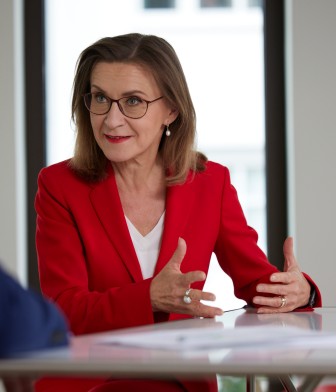
"The most evironmentally sensible way of transport should also become the most economical one."
Ms Nikutta, where are your priorities?
NIKUTTA The desire to shift more goods to environmentally friendly and safe rail transport has been constantly repeated for 50 years. However, the opposite continued to happen. I am convinced that we now have the historic window of opportunity to set the course. The most environmentally sound means of transport should also become the most economically viable means of transport. The German Federal Government has anchored rail freight transport into the coalition agreement more tangibly than ever before. Technical terms such as “single wagon transport”, “digital automatic coupling” or “combined transport” show that the government has really looked at what steps need to be taken. Rescuing the climate is only possible by rail. That makes me very optimistic.
How can rail freight transport also be economically successful?
NIKUTTA We have a large environmental network in Germany – with 35,000 kilometres of rail network and over 2,000 access points to this network. Simple shuttle routes from point to point are commercially successful. However, it is crucial for our environment that we maintain the entire freight network. In technical jargon, this is called single wagon transport. We also pick up individual wagons from customers, even in rural areas, building entire trains from many individual wagons which we then drive across Europe. This makes ecological sense – but it will only become economical if we boost digitalisation and automation as planned. For decades, it was said that we should put as much on the road as possible. Because lorries are fast and flexible, this has long been more cost-effective. However, the total economic costs were never considered. Environmental costs, in particular, never played a role. This reflects our main misconception that the environment is free. Environmental pollution has therefore remained without consequences for decades. Now we are waking up to the hard truth. That’s why the way our goods are transported affects all of us.
They compete with passenger transport, which is also to be directed to the railways. How are you dealing with this?
NIKUTTA In Germany, passenger and freight transport share a common rail infrastructure. It is indeed important to make the best possible use of the capacities. From DB Cargo’s point of view, if more investments are made in rail infrastructure, whether they are driven by the expansion of passenger or freight transport, we see it as a positive development. The best path forward is to quickly expand capacity and – even more quickly – to increase digitalisation and automation. The capacity of the infrastructure is the limiting factor in Germany. I emphasise “in Germany”. Other countries began earlier here, investing more in rail infrastructure. We are now catching up at full speed. The good news is that companies in Germany and Europe have understood that environmentally friendly supply chains are extremely important. Reducing their carbon footprint is the goal of all companies – the shift to rail transport and a good combination of lorries and rail transport are important key elements.
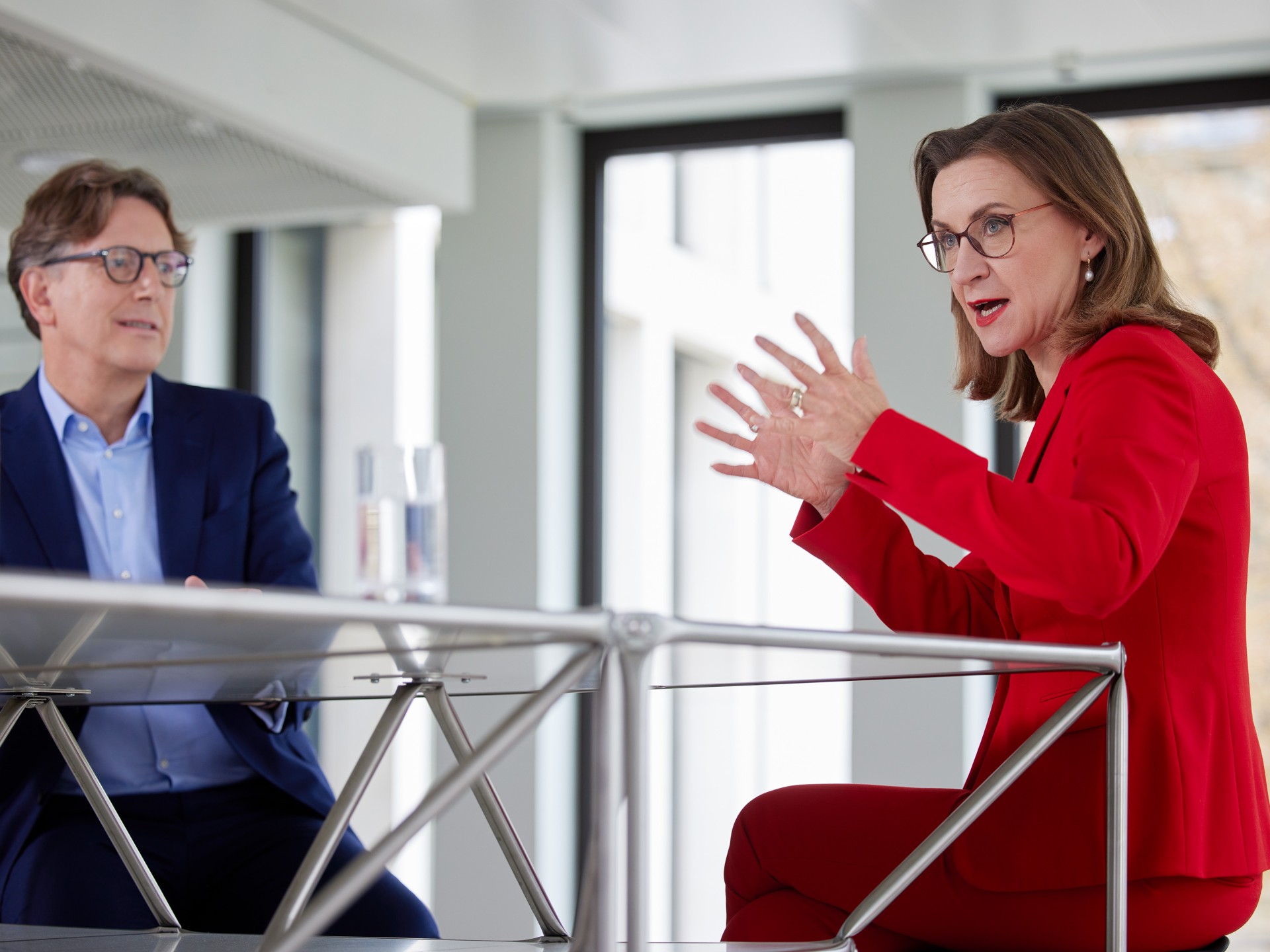
Summit meeting
Sigrid Nikutta and Stefan Wintels at KfW’s Innovation Lab in Frankfurt
Mr Wintels, you have set forth a transformation agenda at KfW. What is behind this?
WINTELS We can only support the economic and social transformation if we transform ourselves. The decade of decision is a matter of social responsibility – in this respect, everyone should make a contribution. We want to develop KfW into a digital transformation and promotional bank in this decade. Part of the “KfW plus” transformation agenda is the aspiration to fulfil the necessary prerequisites at the operational level as a “top-performing KfW”. This includes the topics of digitalisation as well as a modern operating and governance model and, last but not least, aspects such as promoting employee potential and agility. At the same time, we are working on the issues of impact management and mobilising private capital. That’s why we take a close look at the impacts our promotion has – and at what price.
At the moment, KfW is putting a lot of money into saving the large German energy companies. Does this affect day-to-day business?
WINTELS KfW is not unaccustomed to crises. Most recently, we were able to support around 160,000 companies in Germany with our Special Programme to cushion the effects of the coronavirus crisis. The 2022 promotional year is another special year in which we are supporting the German economy in coping with the effects of the war in Ukraine on behalf of the German Federal Government. At the same time, we were able to significantly boost the business volume in the first half of the year, not only in the area of climate change and the environment, but also in the area of digitalisation and innovation. All this shows that we remain true to ourselves and continue to support the economy and society in meeting the challenges of transformation. But there is no doubt – there is still a lot to do!
NIKUTTA Of course, crisis management has also kept us busy, most recently since the coronavirus pandemic. At that time, many lorries were stuck at the borders. And that was the time for rail transport to shine – as it always does in times of crisis. Because we drove our trains all over Europe without any problems and replaced up to 52 lorries with one train. Back then, we not only very quickly distributed masks and sanitary materials from China within Europe, but also basic materials for hygiene supplies and the paper industry. We are now transporting aid supplies to Ukraine and grain from Ukraine. We are the ones who transport coal and mineral oil for the energy supply in winter. The importance of rail is particularly evident in crises. I admire our colleagues of the Ukrainian railway, who maintain the transport chains for people and goods under the most severe conditions and at risk of death.
Ms Nikutta, DB Cargo recently presented a new concept for transporting hydrogen. At the same time, rail transport itself is the victim of the current crisis due to rising energy costs. How do these things fit together?
NIKUTTA Crises also offer opportunities. Our concept for transporting hydrogen is precisely one such opportunity. Rail is undoubtedly the most environmentally friendly means of transport. In freight transport, 95 per cent of our vehicles are electric. In view of the current development of energy prices, it is important for German industry as a whole to quickly find a major solution for our electricity supply. Hydrogen is one such solution. If we import and transport hydrogen on a larger scale in Germany over the next few years, the rail network will be the fastest path. Hydrogen is bound in liquid ammonia for transport, which we have been transporting for a long time. This solution can be implemented immediately with the existing material. It is precisely this solution that we are now testing with large energy providers and we are quickly ready for transport.
Ms Nikutta, what does transformation mean to you?
NIKUTTA For me, transformation and change are very positive terms. As the head of a company, it is important to me that I clearly communicate the fact that constant transformation is our joint task. After all, the demands placed on companies are also in a constant process of change. And here it is important that change is tangible and positive for all employees in the company and for customers. Abrupt external changes offer great opportunities. And if we do it right, I think we have the chance to emerge from the crisis as winners.
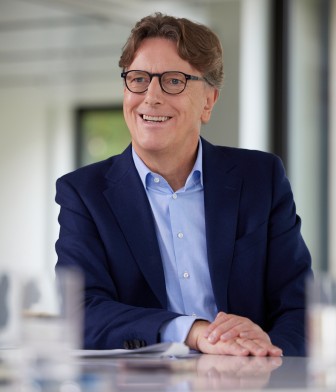
"On New Year’s Eve 2030, we will look back on this decade and say it was a successful one."
Transformation requires good people. How do you attract new employees?
WINTELS We have an extremely positive, sustainable corporate purpose. We shape the transformation, we strengthen resilience, we operate globally and we are part of the economic-political ecosystem. Many people believe that the challenges we face can only be solved through the interplay between politics and business. That makes us very attractive as an employer.
NIKUTTA Today’s students pay much more attention to how meaningful their work is to society and the environment when choosing a career. As a railway company, we have a natural advantage, and we can see it in the number of applicants. As a large company, Deutsche Bahn offers many development opportunities – often for an entire professional lifetime.
WINTELS But we also need to encourage and develop our employees. At the same time, there is fierce competition for IT specialists, especially in Germany. On the one hand, we need to be open to targeted immigration and, on the other hand, invest more consistently in education, because the specialists of tomorrow are going to school today.
NIKUTTA Social background must not be allowed to play a role in this. Parents’ professions still very much determine educational careers. This is where we need to start. In addition, we are experiencing demographic change. We should increase efforts to promote and further develop older high-potential employees. Today we know that diverse teams are the most successful – and not just when it comes to gender – diversity of nationality and age also contribute to success. People who are 55 years old also train with us to learn something completely new. I am convinced that it is worthwhile for the employees and the companies.
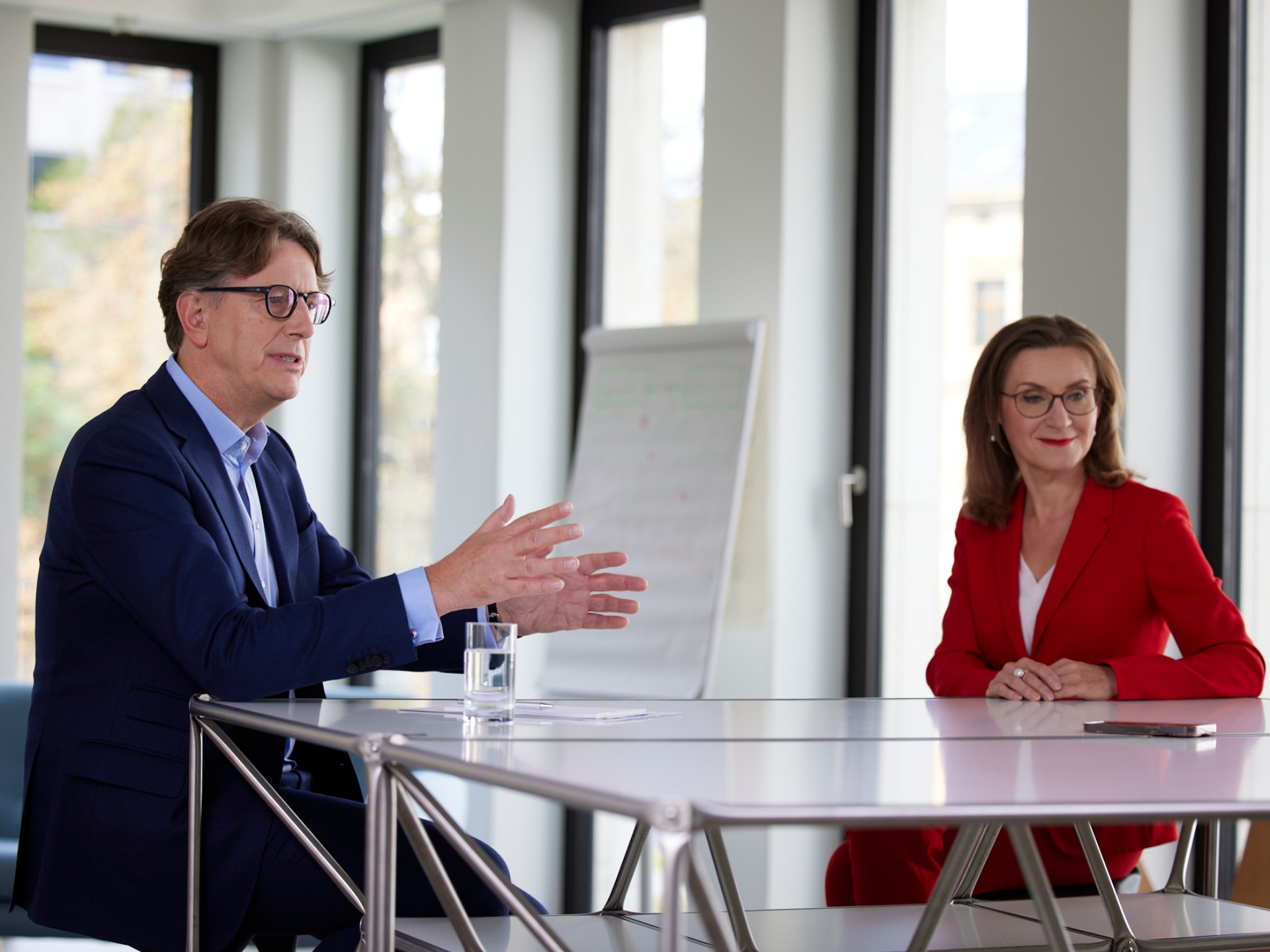
Mr Wintels, in 2030, will we say, “all’s well that ends well”?
WINTELS I am optimistic. If we continue to make bold decisions and implement them quickly, we will succeed. So I would like to answer this question with a bold statement. On New Year’s Eve 2030, we will look back on this decade and say that it was a successful one.
Published on KfW Stories on 10 November 2022.

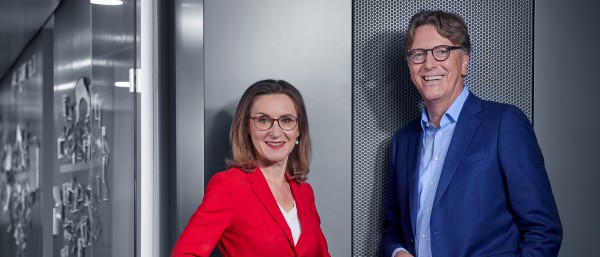

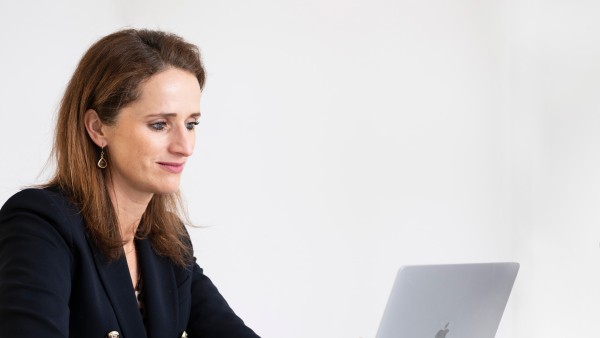
Data protection principles
If you click on one of the following icons, your data will be sent to the corresponding social network.
Privacy information